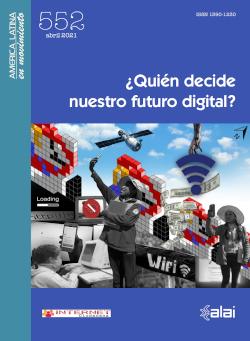Which digital future?
Modest progress has been made to legislate on access to technology, data protection, privacy rights and against abuses of surveillance. But there are also setbacks, such as prioritizing intellectual property, censorship or facial recognition policies for repressive purposes.
- Análisis

| Article published in ALAI’s magazine No. 552: ¿Quién decide nuestro futuro digital? 26/04/2021 |
The pandemic increases the uncertainties we have experienced in recent years. However, it also boosts the search for alternative solutions to the individualism that has predominated in recent decades. It motivates us to reflect on the society we have and the one we want…
For example, it highlights the importance of robust public services, particularly in the healthcare field; of ensuring food sovereignty and valuing the crucial contribution of peasants; of having organized, supportive communities capable of responding to emergencies; of valuing work essential to sustain life, which is often undertaken in difficult conditions; of understanding that our planet is highly interdependent and requires global solutions.
The pandemic also deepens the dependence on digital technologies that, while offering multiple solutions to deal with quarantine, have accentuated the existing social gaps in our region, given the lack of access, connectivity and knowledge that afflict a large part of the population. Moreover, it has reinforced the huge concentration of power and wealth in the hands of the transnational corporations that manage the major Internet platforms and services, mainly the ‘GAFAM’ (Google, Apple, Facebook, Amazon, Microsoft).
In this 21st Century, digitalization has been introduced as a new structuring element of the economy and society, which covers far more than simply technology or communication. It permeates and transforms every single area, from interpersonal relations to macroeconomics and geopolitics, also including culture and the political sphere.
Indeed, the predominant pattern of digitalization today is based on a project to change the model of society that is driven by a powerful sector of business and financial capital, which sees it as a chance to save capitalism from its present crisis, or even to move towards a post-capitalist world governed by artificial intelligence in the hands of a corporate technocracy. This is the orientation of The Great Reset project promoted by the World Economic Forum[1].
So, looking towards the post-covid19 world, a return to the previous status quo does not seem to be a viable or desirable option. We face a dichotomy where the vision of a more egalitarian world, based on solidarity with democratic and community values –where technology and artificial intelligence (AI) can potentially make very valuable contributions– is confronted with a vision that conceives the pandemic as the opportunity to impose that authoritarian and technocratic model, while narrowing space for social protest – and proposal.
For that reason, social and political actors and movements that support greater social justice and that fight for rights, cannot afford to ignore these trends; otherwise they risk being faced with a scenario where the terrain in which they planned their actions has shifted, and that the current fundamental struggles require other strategies for which they are not prepared.
The data economy
In the digital economy, data converted by algorithms into artificial intelligence (AI), become the determinant factor in the economy and the main source of power and wealth. Data and AI are becoming today’s equivalent of what in feudal times was represented by land, and later on industrial capital and intellectual property.
These intelligent digital systems are revolutionizing production forces. At their core is a handful of global companies, providers of these platforms (where actors in broadly diverse fields are interconnected) and of the so-called ‘cloud’ (networks of servers), where data is stored and processed. This feature, together with almost unlimited access to this information, gives a decisive role to technology companies in the data economy. As an illustration: the competition that most worries car manufacturers today is not from companies in their branch, but from Tesla or Google developing “smart” cars. Something similar is occurring in many other branches of economy.
In addition, under the leadership of Google / Alphabet and Facebook, the model of ‘surveillance capitalism’[2] has been established, allowing these companies to register and monetize areas of personal life that were previously outside the market, such as emotions, habits, tastes, and even body movements and intimate thoughts. By means of artificial intelligence, these collected data are transformed into predictive products, which are sold in behavioural futures markets. Their real customers are not the users of their platforms, but other companies or institutions seeking greater security for their investments or their planning, on the basis of the most reliable predictions possible. Moreover, they subsequently realized how directly influencing human behaviour can offer more accurate predictions, by means of manipulation techniques of persuasion or coercion to elicit behaviour that gives the desired result (be it a ‘like’, a purchase, a vote).
It is thus clear that the use of these platforms not only presents a threat to privacy and invasion of intimacy, which in themselves are serious, but also the progressive loss of freedom. To this is added the power that these platforms have assumed, beyond any legal framework, to impose censorship at their free will. All of this leads to a clear erosion of democracy and rights.
Collective responses
The problem is not Internet and digital technologies as such; there is no doubt that they bring enormous advantages that quickly become indispensable to us. The problem is how to change this concentrated model of the digital economy imposed in the last decade and a half. Individually (or sometimes collectively) we may opt, where possible, to choose free/open software and platforms that provide higher security and privacy; this is a valid solution, but still insufficient. Collective pressure is also urgent to achieve legal frameworks and public policies that guarantee rights and curb abuses. As far as our region is concerned, there are specific challenges to develop greater technology sovereignty, due to scant autonomous capacity and strong dependence on transnational corporations (mainly from the USA). Nevertheless, all that is not enough if we do not advance in the definition of an alternative model to the corporate monopolization of digital technologies and to ‘surveillance capitalism'. The proposal of a 'people’s Internet' (Internet Ciudadana) intends precisely to move towards this goal, with reflections, analyses and exploration of alternative models and the strategies to implement them.
Some modest progress has been made in the region to legislate on access to technology, data protection, privacy rights and against abuses of surveillance (whether private or state). But there are also setbacks, such as prioritizing intellectual property, censorship or facial recognition policies for repressive purposes. Measures to compel transnational digital companies to respect national laws and not to evade responsibilities and taxes are hampered by Free Trade Agreements. Little or no progress has been made towards regulating the ownership of data that by default are appropriated and monetized by the enterprise which collects them, disregarding the fact that they belong to the individuals and communities that provide them.
One of the proposals aimed at changing this model, developed by the Just Net Coalition[3] and taken up by the Internet Ciudadana process, has to do precisely with data ownership: who owns the primary economic rights to a given set of data. In the absence of regulation in this regard, companies assume themselves by default to be the owners of the data circulating on their platforms (with or without authorization of whoever provides the data); this is the basis of their accumulation model, which generates enormous profits.
The debate over data ownership usually considers three alternatives. Private ownership in the hands of companies, which represents the current status quo. Public ownership (in the hands of the state or an autonomous body) is definitely valid for data collected by public entities, e.g., taxes, registry office, to improve basic or health services; however, when they contract technology out to private companies, this ownership is not always clearly established. Further, when it comes to surveillance and security issues, clear rules and limits are required. Individual ownership (by the person who generates the data or to whom it refers) must have absolute guarantees of protection where intimate personal data is concerned (which is currently far from the case). Moreover, this protection should not imply recognition that they have economic value, as no one should be pressured to sell their privacy.
But when it comes to aggregated and non-personal data, individual ownership is unrealistic: first, because data only acquires economic value in aggregate, and as individuals we lack the power to negotiate with companies. Therefore, the alternative approach being developed is that data should be considered as common goods, whose patrimonial (and therefore also economic) rights belong –by default– to the community where they are generated and the use of which must be oriented primarily for collective benefit.
A community could be a city, an educational entity, users from a digital social media network, workers of a company or of a platform regarding data they generate, etc. Certainly, it would be necessary to develop frameworks to define the communities: who represents them, how data is identified, how to authorize – or deny – certain uses, how benefits are distributed, and more[4]. But the starting point is to establish the principle of collective ownership.
The debate in progress
In order to advance discussions on these issues in the region, in 2020, within the framework of The Internet Ciudadana process, the Work Sessions on Utopias or Dystopias: the peoples of Latin America and the Caribbean before the digital age' were convened[5]. Five working groups have been reflecting on our digital future in areas such as communication, education, work, rurality and agriculture, and collective digital rights, They have carried out a diagnosis of each area and formulated proposals, with the aim of building a common agenda.
However, these sessions are only a starting point, since we need to open the debate much more broadly. These issues concern not only specialists in technology or communication; they involve all of us in our different areas of work and life, and in our social struggles. If the Internet today is the place where we socialize, inform and organize ourselves, defend ideas and dispute narratives, can we resign ourselves to doing so in spaces where transnational corporations monitor us, impose their rules and practice censorship?
Sally Burch is a British-Ecuadorian journalist, executive director of ALAI, co-facilitator of the Internet Ciudadana process.
Translation of the introductory article to ALAI’s magazine América Latina en Movimiento, No, 552 (April 2021) titled: “¿Quién decide nuestro future digital?” (Who decides our digital future?).
[1] See, for example: "¿Hacia una Nueva Civilización Multipolar?” Wim Dierckxsens and Walter Formento. https://www.alainet.org/es/articulo/211181
[2] The Age of Surveillance Capitalism: the Fight for a human future at the new Frontier of Power. Shoshana Zuboff. Profile Books. 2019.
[3] See: Digital Justice Manifesto, A Call to Own Our Digital Future, Just Net Coalition. https://justnetcoalition.org/digital-justice-manifesto.pdf
[4] See: "It's time to talk about data policy and economic rights" (interview with Parminder Jeet Singh). Sally Burch, April 2020. https://www.alainet.org/en/articulo/205631
[5] The Work Sessions were convened by the Forum on Communication for the Integration of Our America (Foro de Comunicación para la Integración de NuestrAmérica).
Del mismo autor
- Which digital future? 27/05/2021
- ¿Cuál futuro digital? 28/04/2021
- Desafíos para la justicia social en la era digital 19/06/2020
- É hora de falar de política de dados e direitos econômicos 06/04/2020
- Es hora de hablar de política de datos y derechos económicos 01/04/2020
- It’s time to talk about data politics and economic rights 01/04/2020
- 25 de enero: Primer día de protesta mundial contra la 5G 23/01/2020
- January 25: First global day of protest against 5G 23/01/2020
- « En défense de Julian Assange » 02/12/2019
- "En defensa de Julian Assange" 29/11/2019
Clasificado en
Clasificado en:
Internet ciudadana
- Nick Bernards 31/03/2022
- Paola Ricaurte 10/03/2022
- Burcu Kilic 03/03/2022
- Shreeja Sen 25/02/2022
- Internet Ciudadana 16/02/2022









